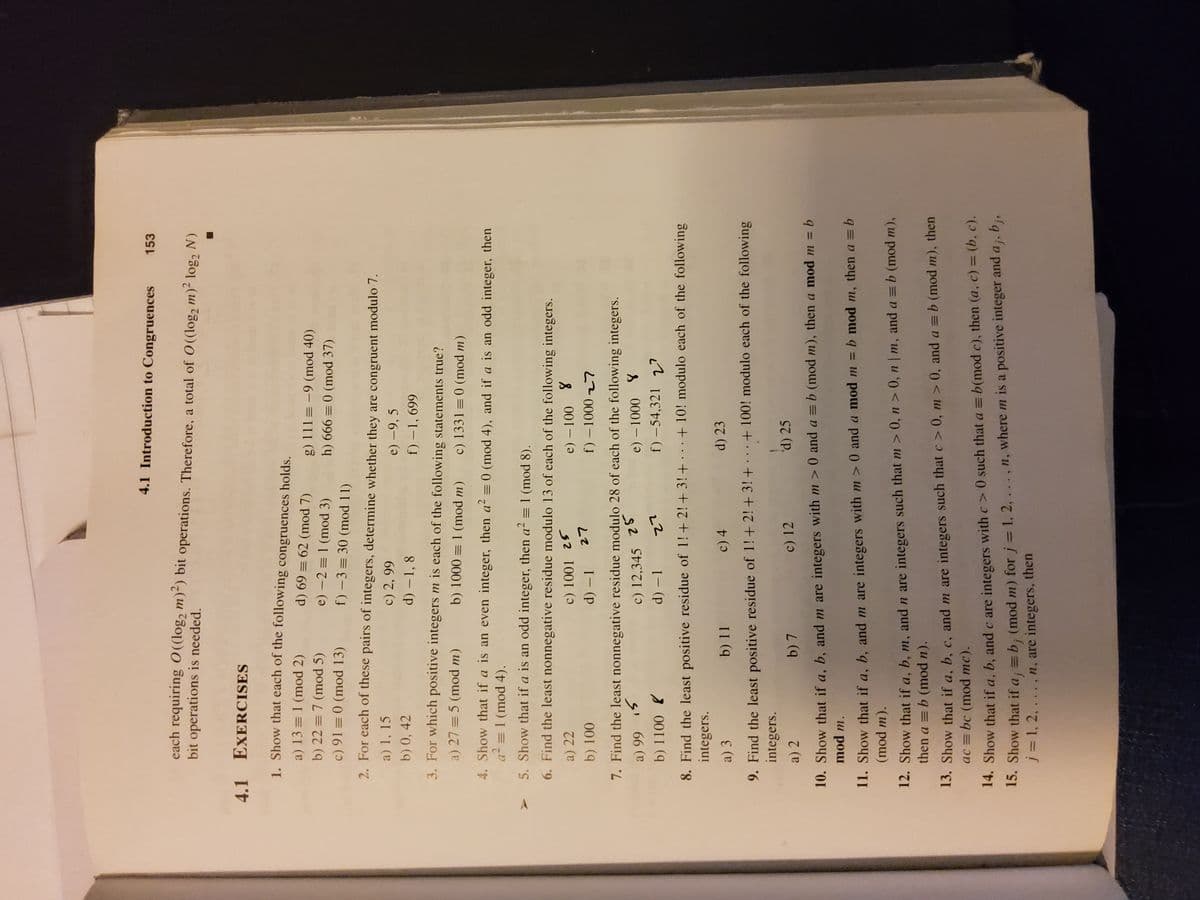Show that if a is an even integer, then a =0 (mod 4), and if a is an odd integer, then a =1 (mod 4).
Show that if a is an even integer, then a =0 (mod 4), and if a is an odd integer, then a =1 (mod 4).
Elements Of Modern Algebra
8th Edition
ISBN:9781285463230
Author:Gilbert, Linda, Jimmie
Publisher:Gilbert, Linda, Jimmie
Chapter2: The Integers
Section2.7: Introduction To Coding Theory (optional)
Problem 12E: Suppose that the check digit is computed as described in Example . Prove that transposition errors...
Related questions
Question
excercise 4.1 #4

Transcribed Image Text:4.1 Introduction to Congruences
153
each requiring O((log, m)²) bit operations. Therefore, a total of O((log2 m)- log2 N)
bit operations is needed.
4.1 EXERCISES
1. Show that each of the following congruences holds.
a) 13 = 1 (mod 2)
g) 111 =-9 (mod 40)
(7 pou) = 69 (P
h) 666 = 0 (mod 37)
b) 22 = 7 (mod 5)
e) -2 = 1 (mod 3)
c) 91 = 0 (mod 13)
f) -3= 30 (mod 11)
2. For each of these pairs of integers, determine whether they are congruent modulo 7.
a) 1, 15
c) 2, 99
e) –9, 5
b) 0, 42
d) –1, 8
669 -
3. For which positive integers m is each of the following statements true?
a) 27 = 5 (mod m)
b) 1000 = 1 (mod m)
c) 1331 = 0 (mod m)
4. Show that if a is an even integer, then a² = 0 (mod 4), and if a is an odd integer, then
a? = 1 (mod 4).
5. Show that if a is an odd integer, then a² = 1 (mod 8).
6. Find the least nonnegative residue modulo 13 of each of the following integers.
a) 22
e) – 100 8
b) 100
d) – 1
7. Find the least nonnegative residue modulo 28 of each of the following integers.
c) 12,345 25
d) – 1
66 e
f) –54,321
v?
22
8. Find the least positive residue of 1!+2! + 3! + · . .+ 10! modulo each of the following
integers.
a) 3
b) 11
c) 4
d) 23
9. Find the least positive residue of 1!+2!+ 3! + . ..+100! modulo each of the following
integers.
b) 7
c) 12
d) 25
a) 2
10. Show that if a, b, and m are integers with m >0 and a = b (mod m), then a mod m = b
mod m.
11. Show that if a, b, and m are integers with m > 0 and a mod m = b mod m, then a = b
(mod m).
12. Show that if a, b, m, andn are integers such that m > 0, n > 0, n | m, and a = b (mod m),
then a = b (mod n).
13. Show that if a, b, c, and m are integers such that c > 0, m > 0, and a = b (mod m), then
ac = bc (mod mc).
14. Show that if a, b, and c are integers with c>0 such that a = b(mod c), then (a, c) = (b, c).
15. Show that if a; = b; (mod m) for j= 1, 2,
j = 1, 2, .. ., n, are integers, then
%3D
.. .,n, where m is a positive integer and a ;, b;,
Expert Solution
This question has been solved!
Explore an expertly crafted, step-by-step solution for a thorough understanding of key concepts.
Step by step
Solved in 2 steps

Recommended textbooks for you

Elements Of Modern Algebra
Algebra
ISBN:
9781285463230
Author:
Gilbert, Linda, Jimmie
Publisher:
Cengage Learning,

Elements Of Modern Algebra
Algebra
ISBN:
9781285463230
Author:
Gilbert, Linda, Jimmie
Publisher:
Cengage Learning,